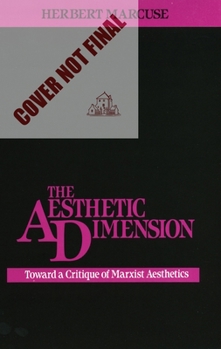The Aesthetic Dimension: Toward a Critique of Marxist Aesthetics
Select Format
Select Condition 
Book Overview
Developing a concept briefly introduced in 'Counterrevolution and Revolt, ' Marcuse here addresses the shortcomings of Marxist aesthetic theory and explores a dialectical aesthetic in which art... This description may be from another edition of this product.
Format:Paperback
Language:English
ISBN:0807015199
ISBN13:9780807015193
Release Date:June 1979
Publisher:Beacon Press
Length:108 Pages
Weight:0.31 lbs.
Dimensions:0.3" x 5.2" x 8.0"
Customer Reviews
2 ratings
Delving in the emancipatory aesthetic
Published by Thriftbooks.com User , 19 years ago
Marcuse uses a critical approach, not to merely argue against a Marxist perspective on art, but rather to highlight the emancipatory potential in art. This is because its form is autonomous relative to a set of social relations, and insofar that `content becomes form' (p. 8), art is able to represent the prevailing and petrified un-freedom. Against the perspective of a social construction of art, Marcuse capitalizes on the notion of "subjectivity" as the counter-force to ground his thesis. That is, `the radical qualities of art ... are grounded precisely in the dimensions where art transcends its social determination and emancipates itself from the given universe of discourse and behavior while preserving its overwhelming presence'. This is to say that art's emancipatory potential lies in its refusal to subjection, in its survival to preserve its subjectivity. Against maybe Adorno, for Marcuse this is the case because `art's separation from the process of material production' points to some unique qualities of art: its own language and dimension of affirmation and negation. Despite the emancipatory potential, Marcuse is well aware that art cannot change the world but rather change consciousness, so as to hope for change the world: art is a means, and an effective one on condition that the tension between art and radical praxis is kept alive. This, however, should not be understood in a materialist sense, that the more emancipatory pieces of work are produced, the more likely to change the world is. Indeed, speaking of Goethe, Marcuse claims that `it is absurd to conclude that we need more Iphigenies' (p. 58) to express emancipatory humanism. Rather, this ideal transcends given praxis, along with social changes, hence a continuous need for such emancipatory art irrespective of materialist considerations. If art for Marcuse fights reification, it also fights against the risk of "forgetting" by making the petrified world speak!This is to say, here is a worthy attempt to remind us of the importance of creativity in making a difference in our society!
pithy and to the point
Published by Thriftbooks.com User , 23 years ago
Herbert Marcuse, original member of the so-called 'Frankfurt School', here presents a critique of Marxist aesthetics in one of his last books. Although only 72 pages long, the book is powerful in its argument against the orthodox Marxist view that 'art represents its the interests and world outlook of particular social classes.' Marcuse argues for the importance of art in itself, apart from its source, writing, 'the criteria for the progressive character of art are given only in the work itself as a whole: in what it says and how it says it.' He truly believes that art's place in the world is not to change the world directly but to influence how people perceive the world and thereby lead them to change it.Marcuse also touches upon other aspects of aesthetics, like his belief in a constant standard allowing us to distinguish between high and low art and the question of the 'end of art' as posited by Bertolt Brecht and others. Nevertheless his main argument is most powerful: he ends the book by praising art's role in representing 'the ultimate goal of all revolutions: the freedom and happiness of the individual.'Truly a valuable book for all students of art, aesthetics and philosophy.





